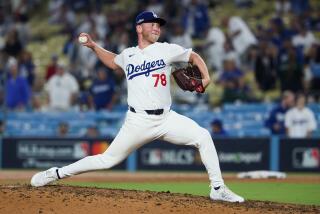Theyâre Unarmed and Definitely Dangerous
History and infamy are closing in on the Detroit Tigers. Theyâre concerned, and rightfully so, their pitching staff will be tagged as the worst in the history of the game.
Thatâs a heavy burden for a club stocked primarily with youngsters and castoffs, a team desperately trying to avoid setting a major league record for futility.
The 1930 Philadelphia Philliesâ 6.70 staff earned-run average is the highest in major league history. Sixty-six years later, the Tigers have spent much of the season threatening to top it.
âWe certainly donât want that record on our heads,â first-year Manager Buddy Bell said last week in Anaheim.
Odds are not in the Tigersâ favor. Take a look at that starting rotation.
Thereâs Felipe Lira, 6-8 with a 5.84 ERA. C.J. Nitkowski, 2-2, 7.76 ERA. Omar Olivares, 5-7, 4.66 ERA. A.J. Sager, 2-2, 5.12 ERA. And Brian Williams, 2-8, 6.65.
And the bullpen?
Make no mistake, the Tigers are running scared. They know theyâre not good.
One night in June, a reporter asked club President John McHale if he was disappointed in a turnout of 8,543 at Tiger Stadium.
âThere are a lot of nights when Iâd like to go out there and thank every one of those 8,000 for coming and putting up with what weâve given them,â McHale said.
Still, the Tigers are not resigned to leaving their mark in the record books. Theyâre determined to go down swinging. Heaven knows they canât rely on those arms.
Heading into Wednesday nightâs game against the Angels, Detroitâs team ERA is 6.73, worst in the majors but about average for the Tigers in 1996. Detroitâs ERA was 6.95 on May 31. It was 6.69 at the all-star break and 6.82 last week in Anaheim.
Itâs hardly a source of pride for a franchise rich in tradition but forced by budget concerns to dump high-salaried players and start from scratch.
âWe donât match up,â Bell said. âWe just donât. Thereâs no other way to say it. We have a lot of guys without big league experience, who have no idea how to pitch in the big leagues.
âAnd the batters are better.â
More often than not opposing pitchers are better too, which explains why the Tigersâ 34-72 record and their .256 batting average also are the worst in the majors.
The Philliesâ staff couldnât complain about a lack of support in 1930. Hall of Fame right fielder Chuck Klein batted .386 with 40 home runs and 170 runs batted in.
In a hitting era, the Philliesâ pitchers couldnât parlay Kleinâs standout 1930 season into victories. Left-hander Leo âSugarâ Sweetland had a 7-15 record and team-high 7.71 ERA. Right-hander Phil Collins led the club with a 16-11 record and 4.78 ERA.
With numbers like those, it was no wonder the Phillies lost 102 games and finished last in the National League.
Cecil Fielder knows how Klein must have felt. Experiencing the Tigersâ slide from respectable to revolting has been tough to take for a veteran like Fielder.
âWeâve got a lot of young pitchers who have never been through the majors before and donât know what to expect,â Fielder said. âThere have been a lot of trades. Thereâs not a lot of team chemistry when new guys are constantly being introduced.
âNone of this has worked out.â
True, the Tigers last Tuesday against the Angels started five players who werenât in the media guide. But surely Fielder must have some sympathy for struggling pitchers like Olivares and Williams, right?
âI donât feel sorry for them because itâs a great opportunity,â Fielder said. âTheyâve been given an opportunity to play and compete in the big leagues and they havenât gotten the job done. Some of them arenât going to be around next year because management will bring in a new group. They donât want to go through this again.â
Olivares, 29, pitched in the San Diego, St. Louis, Colorado and Philadelphia organizations before signing with the Tigers as a free agent last winter. He has been among the best of Detroitâs starters, pitching into the eighth inning or later in seven of 15 starts--tops on the club.
Like his beleaguered teammates, though, Olivares has searched for solace in this lost season.
âItâs just a matter of luck now,â he said after pitching his second complete game this year, but losing, 1-0, to the Angels last week. âThatâs just the way itâs going these days.â
Even when the Tigers win, as in a 10-9 victory over Milwaukee two weeks ago, odd stuff happens.
Sager, a 10th-round draft pick by San Diego in 1988, gave up 11 singles and one home run and still got the victory. Detroit had 17 hits, including Brad Ausmusâ single on a pitch that bounced before he hit it.
Asked later if he had seen that before, Ausmus replied, âMaybe in cricket.â
The night before, the Tigers gave up 20 runs or more for the second time this season, in a 20-7 loss to the Brewers.
The Tigers also lost to the Minnesota Twins, 24-11, April 24, which incredibly enough is not the most runs given up in the majors this season. Baltimore lost a 26-7 decision to Texas on April 19.
The Tigersâ litany of failure extends beyond mere runs allowed. They gave up 21 hits in one game. They have walked 12 batters in a game twice. They have hit three batters in a game three times.
Williams, a right-hander who was 3-10 with a 6.00 ERA for San Diego last year, has the Tigersâ longest streak of scoreless innings at 17 2/3. Thatâs fine work to be sure, but Orel Hershiserâs major league record of 59 innings is probably safe.
How did the Tigers get this bad?
Dumping salaries was the start. A lack of quality pitching throughout the game, but particularly in the Tigersâ minor league system, also canât be overlooked. Neither can the relentless parade of baseballs leaving ballparks around the majors.
Detroit pitchers are not the only ones to suffer. Last year, the average team ERA in the American League was 4.71. This year, itâs 5.11.
âItâs all relative to everything else,â said Angel Manager Marcel Lachemann, whose staff has a 5.25 ERA. âIt used to be that a 2.00 ERA was something special for a starting pitcher. Now, itâs 3.50. You have to go by the league averages. The standards are going to change because the gameâs going to change.â
Bell still cringes when he scans the daily statistics.
âI donât think a 5.00 or 6.00 ERA is very good under any circumstances,â he said. âThere are a lot of guys pitching in the big leagues now that probably shouldnât be here. Itâs a good opportunity for them. I donât think it will set them back for their entire career. They can take advantage of it or not.â
So far, the Tiger pitchers seem bent on failure.
Maybe Bell hasnât been watching closely enough, but he believes better days are ahead.
âThe nine guys weâve got on the field, well, there are some holes there, but if we could get some pitching we could be right there in the middle of the pack,â he said. âI can see us being very competitive. If we get some good pitching we can win. If you stay close in this league youâve got a chance.
âEverybodyâs trying to put themselves in that situation.â
No team more so than the 1996 Detroit Tigers.
(BEGIN TEXT OF INFOBOX / INFOGRAPHIC)
CALL IT A STAFF INFECTION
How the Detroit Tigersâ 1996 pitching staff ranks with the worst in baseball history:
HITS
* Detroit: 11.0 (15th-worst all-time)* Worst: 13.1, 1930 Philadelphia
HOME RUNS
* Detroit: 1.65
* Worst: 1.49 (1995 Minnesota)
EARNED-RUN AVERAGE
* Detroit: 6.73
* Worst: 6.71 (1930 Philadelphia)
RECORD
* Detroit: 34-72
* Worst: 40-120 (1962 New York Mets)
WALKS
* Detroit: 5.07 (4th-worst all-time)
* Worst: 5.52 (1915 Phialdelphia (AL)
STRIKEOUTS
* Detroit: 5.97 (Not in top 25 all-time)
* Worst: 1.85 (1902 Detroit)
COMPLETE GAMES
* Detroit: 6
* Worst: 1 (1995 Colorado)
SHUTOUTS
* Detroit: 3
* Worst: 0 (1993 Colorado)
More to Read
Go beyond the scoreboard
Get the latest on L.A.'s teams in the daily Sports Report newsletter.
You may occasionally receive promotional content from the Los Angeles Times.






